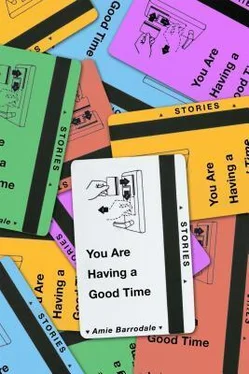Greer looked down at the page Donald had given him. The poem began, “She dropped to all four paws, stood still and looked at me.”
It was a poem about losing his virginity. Donald had slept with an older woman when they were driving her car to Colorado. She made him wait to penetrate her until the numbers on the odometer rolled over from 99,999 to zeros. It was a good poem.
Donald was still explaining why he was late with his poem. It was due to his living situation, which sounded complicated.
“Why’d you move in?” Berryman asked. He was sympathetic.
“It’s actually pretty nice. Plus it was the first listing that I saw,” Donald said. “I’ve been having sort of a difficult time. We aren’t all famous professors. Some of us have tax liens. I have a tax lien, from a speaking engagement I did three years ago. I regret accepting it. I had to pretend to be Chickasaw. I don’t have any money to pay this lien, and now they’re trying to take it from my mother, who happens to be dying in a hospital — and my father, well, if you’d read my poem at all, you’d know that he is a rapist.”
After a moment, Berryman said, “Well. What else. What did you like, what didn’t you?”
Donald took a seat. He raised his hand.
“Yes, fine, you,” Berryman said, “no need to raise your hand.”
“I didn’t get a chance to read the poems.”
“That’s all right.”
“I’d like the opportunity to participate.”
“Next time.”
“Please, Professor Berryman. Please. Let me participate.”
Berryman asked the students to pass the poems to Donald, and he flipped through the pages with theatrical irritation. He appeared to be reading first lines. Then he came to a stop. He raised his hand.
“Yes, Mr. Burdon,” Berryman said. “Go ahead.”
Donald read Greer’s poem aloud, from start to finish.
* * *
Later that week, Donald taught Greer about cocaine. He said, “To get it, and this is not something I tell you with pleasure, we will have to go into Brown Town. I know that it would be better if I had a dealer, but you see once one has a dealer one runs into the problem of becoming an addict, at least this way — watch your step.”
Donald pointed to a pile of dog shit. He took Greer to a part of town Greer had never seen or heard of before. He was pretty sure no one knew about it, and he even wondered if perhaps it was a place that Donald had dreamed. It was a ghetto.
Donald stopped at a payphone and picked up the receiver. “Quit pacing! You look like a narc.”
A few minutes later a man in a leather coat walked by. He had his hands in his pockets. Greer put his hands in his pockets.
“Come on,” Donald said. He walked Greer around to the other side of the street. On the corner he handed a young woman money. They returned to the phone. Donald picked up the receiver. A few moments later, the man in the leather coat walked by again. This time, he spat at Donald’s feet and said, “Be back, bitch.”
Donald dove down and grabbed the small wad of tin foil. He took a cosmetic mirror out of his pocket and emptied the coke onto it. He sniffed half and passed the mirror to Greer. He said, “Come on.” They went to Kenney’s Bar, where they saw Berryman.
“Absolute fucking shit,” he said.
“Mr. Berryman?”
“Go home. Get a fry cook. Thas a profeshun.”
“May we join you?” Donald said. “May we buy you a drink?”
Berryman took a long drink, leaving beer foam in his beard. “You there in back!” he shouted. “Black man!”
Greer followed Berryman’s gaze to a window to the kitchen, where a cook was making hamburgers. “Now thas a man. That black … guy. Monsieur Le Chef! Salud!” Berryman raised his glass and smiled, then began to sing along with the jukebox in a high, slushy voice. The cook ignored him.
Berryman tried to roll a cigarette. Most of the tobacco ended up on his hands and jacket. He smoothed his oily hair, then he padded his pockets in search of a lighter. The bartender slid one down the bar. Berryman didn’t notice.
Donald Burdon picked up the lighter and held it before Berryman, who clasped Donald’s hand and took his time.
Donald said, “Professor Berryman, may we join you?”
Berryman inhaled. He coughed and swallowed.
“Mr. Berryman?”
“Wha.”
“May we join you?” Donald said. “May we buy you a drink?”
“You there!” Berryman shouted. “Black man!”
Greer started.
Berryman knocked over his beer.
“That’s okay. That’s okay,” Berryman said. “I’m okay.”
“A scotch,” Donald said.
The bartender poured a scotch, and Donald placed it on a coaster before Berryman.
“A gentleman! Thank you, kind sir.”
Berryman held up his glass. “You there! Black man. First sip for the chef!” He took a sip of scotch. “Now thas a man. That black … guy. Monsieur Le Chef!”
Berryman turned his head and looked at his students. After a few moments he recognized them. He put his arm around Donald and gave him a kiss on the cheek. “These are my students,” he said to the bartender.
The bartender frowned. Berryman waved a dismissive hand at him. He turned back to Donald and Greer.
“New York City. Thas a lesson. Sit down with the editors. Then you’ll get a lesson in cocksucking.”
“Well, of course,” Greer said. He sipped his beer. “But first I want to master the form.”
Berryman caught himself on Greer’s shoulder and left his hand there.
Greer said, “Mr. Berryman, writing isn’t a choice I made. I mean, it just sort of happened. I guess I was lonely, and I didn’t get along with people, and I was inspired by — or I was imitating — poems like yours. Then one thing led to another, and here I am.”
Berryman laughed long, loud, and hard into Greer’s face. He slapped a worn-out drunk beside him. The man had a long, red, dimpled potato nose and he wore a zip-up felt jacket.
Berryman spoke to the drunk. The two murmured back and forth. He was done with the students. Greer took out his wallet.
“I’ll tell you one … thing,” Berryman said. “The writer is slime.”
“You’re drunk,” Greer said.
Berryman turned.
“I’ll tell you why you write.”
Greer was frightened.
Berryman said, “You went to a party one time. You were sort of maybe half invited. You spoke to a girl, and you felt like she ignored you. You spoke to another girl, and it seemed like she ignored you, too. Then a third girl ignored you. That’s it. Everything spun from a habit you formed one night, at a party when you felt you were ignored. So don’t you talk to me about imitation. Don’t you talk to me about imitation.”
“Let’s go,” Donald said.
“Sit down!” Berryman shouted. “Learn something!”
It was the last time either of the young men saw him. Later the same night Berryman was unable to get his key working in the door of his apartment. He woke up his landlord, singing, “I know that you hate me, John Lansman. You have hate in your heart.” When his landlord refused to open the front door, Berryman pulled down his pants and defecated on the porch. He did not return to school. Later the boys learned that he had been fired.
* * *
After graduating, Greer was hired at Columbia. He went from assistant to associate professor quickly. At twenty-seven, he was on the campus-wide promotion and tenure committee.
He was still single. He went to bars looking for women. It was at the bar across from his office that he saw Donald, who sat alone in the corner fingering the lock on an expensive crocodile briefcase. Greer brought him a scotch.
“Monsieur le chef, salud!” Greer said.
Donald looked up and laughed. He explained that he had a job as a research assistant to an old woman who was writing a memoir about her father, a Hollywood producer. “A scion,” Donald said. “These shitty memoirs are always about someone’s famous great-grandmother.”
Читать дальше












